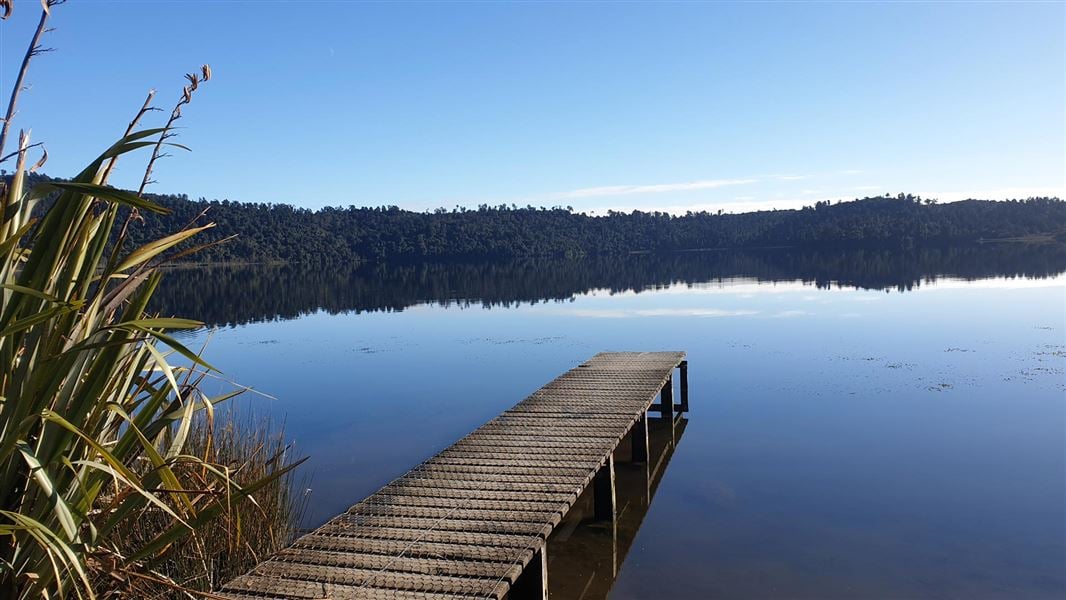Archived content: This media release was accurate on the date of publication.
Date: 17 August 2023
The call comes in Conservation Week which celebrates conservation work across the country and encourages people to take action for the environment.
The message to West Coast lake users is clean, check, dry and report to stop freshwater pests from spreading in local waters which have some of the most outstanding natural values in the country.
DOC Hokitika Operations Manager Owen Kilgour says some pest threats, such as lindavia (lake snow), can’t be seen by the naked eye on a tramping boot or boat.
“A single drop of water, plant fragment or fish egg can be all it takes to spread an invasive freshwater pest from a contaminated waterbody to a pristine one.”
“Pests to look out for on the West Coast include gambusia or mosquito fish, rudd, koi carp, oxygen weeds (hornwort, egeria, lagarosiphon), and Parrot’s feather. Some of these such as gambusia, koi carp, and hornwort aren’t on the Coast, while others have very limited distribution. If we all do our bit we can prevent the spread.”
Freshwater pests which get into lakes squeeze out native freshwater vegetation and fish. Weeds such as lagarosiphon are bad for water quality and reduce dissolved oxygen, which affects native species and sports fish habitats.
Where freshwater weeds grow in waterways and drains, they exacerbate flooding in the surrounding catchment. Both pest fish and weedy plants are extremely difficult and expensive to get rid of once established.
“We all need to do our bit and protect our lakes by always checking, cleaning and drying gear that’s been in contact with water before moving on,” Owen Kilgour says. “Early detection is essential to managing new incursions and preserving lake quality.”
West Coast Regional Council (WCRC) leads an annual surveillance programme in conjunction with DOC’s Freshwater Biosecurity programme to detect incursions of introduced freshwater weeds on the West Coast.
WCRC Biosecurity Coordinator Taylor Blyth says each summer a number of lakes are selected for surveillance based on incursion risk and previous surveillance history.
“The problem species we’ve found in West Coast waterbodies which are the biggest worry are lagarosiphon major, and egeria densa. Lagarosiphon is already in Lakes Paringa and Ianthe and the Kapitea Reservoir. Egeria is known to occupy two sites within the region.
“We’re using environmental DNA (eDNA) as part of our surveillance so we might pick up a new incursion, but as our checks are only done annually it’s not a silver bullet. The most effective approach is to stop weeds, such as lagarosiphon, from spreading to lakes like Moeraki just down the road from Paringa.”
Taylor Blyth says jet boaters visiting the Coast from Canterbury or Central Otago could potentially spread freshwater pests to every waterbody they visit.
“South Westland communities are concerned about the lagarosiphon and we’re working to progress weed cordons in these lakes to reduce the chance of spreading elsewhere. One of our next steps with the surveillance programme is to do an intensive grid search late spring,” says Owen Kilgour.
“But unless we all work hard to check and clean equipment, then report any pests found while enjoying what the West Coast has to offer, it’s only a matter of time before pests spread.”
Discoveries of any freshwater pest should be reported via the Find a Pest or iNaturalist apps. People can also contact WCRC directly by emailing clear photographs and coordinates to info@wcrc.govt.nz.
Further information
Check, Clean, Dry, Report
- Check: Remove any plant matter from your gear and leave it at the site (the river or lake bank) or put it in the rubbish. Don't wash plant material down any drain.
- Clean: Use 10% dishwashing detergent mixed with water and leave the item wet for 10 minutes.
- Dry: Ensure your gear is completely dry to touch, inside and out, then leave dry for at least another 48 hours before you use it (didymo can survive for months on moist gear).
- Report: Find a Pest or iNaturalist
Conservation Week
Conservation Week runs from 14-20 August with a theme of taking action for nature.
Contact
For media enquiries contact:
Email: media@doc.govt.nz
